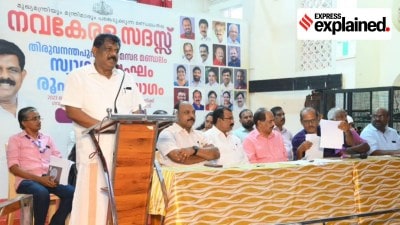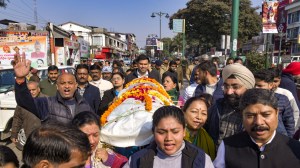The limits on legislative privileges
H.M. SEERVAIs close associate T.R. ANDHYARUJINA,on how Indias greatest constitutional commentator was called to defend the indefensible....
The Constitution of India was brought into force on 26th January,1950,which we call the Republic Day. It is a matter of satisfaction for India that its Constitution has survived for sixty years,keeping alive its democratic institutions when contemporaneous Constitutions of other countries have failed. Sixty years after the advent of our Constitution it is right to recall the eminent lawyers who in the early days of our Constitution helped to enlighten it and firmly lay its foundation. Foremost amongst these lawyers was the late H.M. Seervai.
In the early days of the Constitution,there were no judicial precedents for elucidation of a written Constitution. Seervai therefore invoked fundamental principles of Constitutional law,always bearing in mind that it was a Constitution which was being expounded and not an ordinary law.
He was a powerful and fearless advocate,a man of courage and conviction with a great command over the English language. Uniquely,he held the office of Advocate-General of Maharashtra for 17 years. With considerable sacrifice,he devoted himself exclusively to the work of his State shunning all private practice and defended difficult and unpopular decisions in court. Though he was the principal law officer of the State he was politically neutral and knew no politician. So great was his stature that other Governments sought his services.
In 1964,he was chosen by the Uttar Pradesh Vidhan Sabha to defend its apparently outrageous action of issuing warrants of arrest of two judges of Allahabad High Court in exercise of its legislative privileges. The Assembly believed that only Seervai with his fearless arguments would be able to tell the Supreme Court judges that they could not control the privileges of legislatures. He did this without hesitation. I remember how in an electrifying moment in the Supreme Court,he told the Court that its order would be disregarded as a nullity if it exceeded its jurisdiction,a statement which any other lawyer would consider not only disrespectful but imprudent.
In 1972,the Government of India chose Seervai as its leading Counsel in precedence over the then Attorney-General for India to defend Parliaments plenary powers to amend the Constitution in the famous Kesavananda Bharti case before the largest bench of 13 judges of the Supreme Court ever constituted to overrule the Supreme Courts judgment in Golak Nath which held that Parliament could not amend fundamental rights. Seervai argued with great vehemence for 22 days for Parliaments unrestricted powers to amend the Constitution including fundamental rights. After 67 days of hearing,six judges upheld his view,other six judges held that Parliaments power to amend was limited by implied limitations. The remaining Judge Justice Khanna titled the balance. Whilst holding that power to amend the Constitution was plenary,he said Parliament could not change the basic structure of the Constitution by an amendment. Justice Khannas view was considered as the view of the majority of judges.
Later in 1975,when Parliament in abuse of its amending power made amendments to the Constitution to validate Mrs Indira Gandhis election,Seervai had the intellectual courage to change his view. He then subscribed to the theory that Parliaments power to amend the Constitution was limited by the basic structure of the Constitution.
In 1961,Seervai believed that the time had come for him to devote his energies to correct and critically comment on the judgments of the Supreme Court. For 30 years he devoted himself to writing his magnum opus,The Constitutional Law of India in three volumes. It was a highly critical commentary on the decisions of the Supreme Court. In the book he boldly stated that a decision of the Supreme Court was productive of a great public mischief and should be overruled. The book has become a book of reference not only in India but in other countries of the world. In that sense unlike other eminent lawyers who also contributed to the exposition of the Constitution but have died,Seervai still lives in courts.
Recognition of his work came in many ways. He was offered a judgeship of the Supreme Court twice which he declined. He was conferred the Padma Vibhushan in 1972. He was made a Fellow of the British Academy Government of India desired to appoint him the Attorney-General for India in 1971. He declined the office stating that the best contribution by him would be to embody in successive editions of his book the correct judicial interpretation of the Constitution.
At the age of 89 Seervai continued to labour on the last edition of his monumental book. He completed the last page on the day preceding his death. He died appropriately on Republic Day on 26th January,1996.
The writer is a senior advocate of the Supreme Court,former SG, and appeared with Seervai in many cases
- 01
- 02
- 03
- 04
- 05































